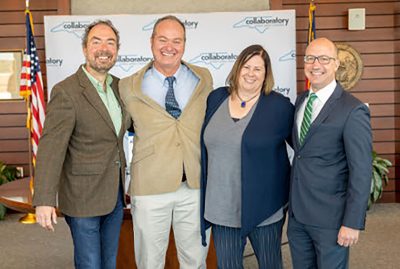
State regulators and the academic researchers studying man-made chemical compounds that industries in North Carolina are releasing into the environment have forged a fellowship program.
North Carolina Department of Environmental Quality Secretary Elizabeth Biser announced Friday the formation of the DEQ Applied Research Fellowship in partnership with the North Carolina Collaboratory to address per- and polyfluoroalkyl, or PFAS, in the state.
Supporter Spotlight
“This fellowship is an opportunity for DEQ and the leading scientific experts on PFAS to work together to improve our understanding of these forever chemicals and generate the scientific data we need to protect our communities and protect our drinking water,” Biser said.
The announcement was made at the third National PFAS Conference, a three-day event hosted this year on the campus of Cape Fear Community College in downtown Wilmington.
The conference, attended by more than 100 people from throughout the country, included dozens of speakers who shared their stories about how PFAS exposure has impacted their lives, and the scientists who are studying how the chemical compounds affect human health from gestation to adulthood.
PFAS have become a focus in the Cape Fear region after the public was first made aware five years ago that the Chemours Co.’s Fayetteville Works Facility was discharging chemical contaminants into the Cape Fear River, a raw drinking water source for tens of thousands of people.
The newly formed fellowship program creates an opportunity for researchers and DEQ staff to identify and address gaps in information about PFAS and identify research needs, according to a DEQ press release.
Supporter Spotlight
“The Collaboratory and DEQ have had a long and effective partnership to better understand PFAS in our State – sharing data and methodologies, utilizing academic labs to run water monitoring samples when the EPA was impacted by the last governmental shutdown a few years back, and facilitating both informal and formal roundtables between our university experts and DEQ leadership and staff,” said Jeffrey Warren, the Collaboratory’s executive director. “This fellowship program is unique and a win-win; the faculty members will be able to better understand how scientific data are used in the policy and regulatory space while DEQ regulators can better understand how the academic investigations are designed and executed as well as how the extensive datasets are generated and analyzed.”
The Collaboratory, established in 2016 by the North Carolina General Assembly, will fund the fellowship program.
Jamie DeWitt, associate professor at East Carolina University, and Lee Ferguson, associate professor at Duke University, have been selected as the program’s fall 2022 fellows to assist DEQ with PFAS-related laboratory methods, data analysis and field sampling, according to the release.
Detlef Knappe, a professor at North Carolina State University and deputy director of the N.C. State Superfund Center, will be the spring 2023 fellow. University of North Carolina Wilmington Professor Ralph Mead, head researcher of the PFAS Testing Network’s team studying the impacts of PFAS on air quality, has been chosen to be the summer 2023 fellow.







